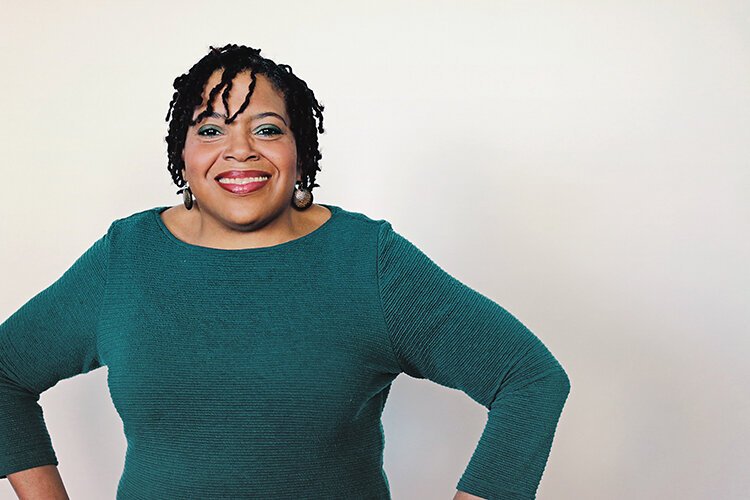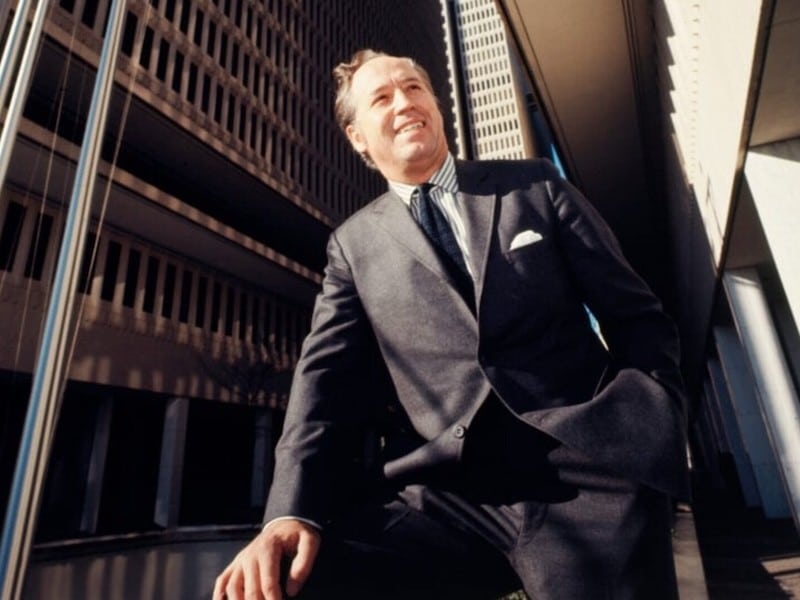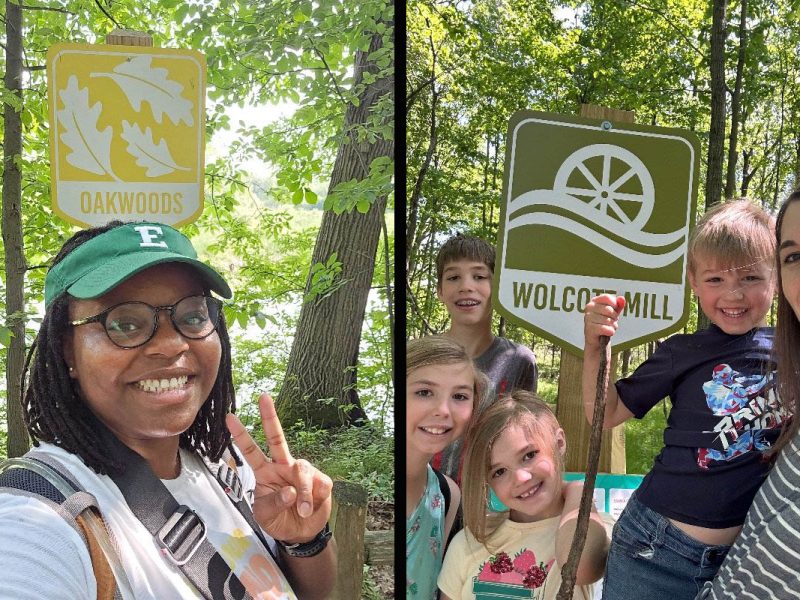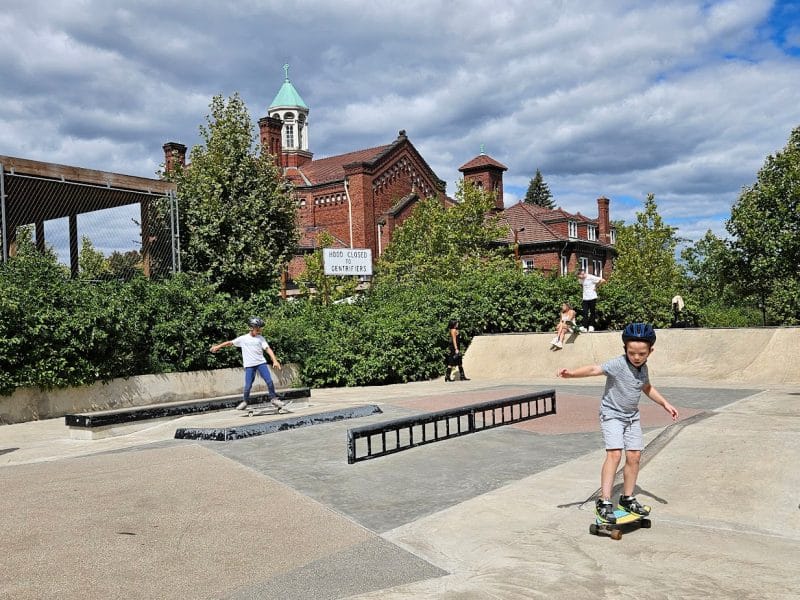Detroit journalist Biba Adams uses her platform to be a ‘voice for the voiceless’
Longtime Detroit journalist Biba Adams' journey comes full circle with her new role as chief storyteller for Marygrove Conservancy.
One day Biba Adams was in the car with her mom, a Marygrove College alum who also worked at the Fitzgerald institution, when Adams saw a course catalog. She flipped through it and the listing for a Certificate in Detroit studies caught her eye.
“And I thought that was so funny. Like, honestly, I thought it was a joke,” she recalls. “I’m like, Detroit studies. Hahaha, what are you going to teach me, like coney island and Belle Isle?” But she thought it would make a good story so she pitched it to her editor at “Real Detroit Weekly” at the time. After interviewing the professor, she didn’t think it was a joke anymore. In fact, she was “fascinated.”
She enrolled at the college a few months later and eventually earned her bachelor’s degree in history at age 30.
Now she’ll be telling the story of fellow alums as well as nonprofits and small businesses as part of her new role as chief storyteller for Marygrove Conservancy.
It’s a role Racheal Allen, chief operating officer at Marygrove Conservancy, was interested in having at the nonprofit and Adams was the perfect person for the job, she says.
Both say this role differs from a PR or marketing rep. Adams says Allen is not interested in clicks, and Allen says Adams will be using her creativity to tell stories that may not be “newsworthy” but are still worth sharing, stories such as Nezaa Bandele, aka Mama Nezaa of Paradise Natural Foods. The conservancy is launching Marygrove Market, which will feature local food entrepreneurs and local makers to serve the community, including the newly launched Community Impact Incubator. While working with Paradise Natural Foods, Allen learned how the company sources enough raw materials from a village in Ghana to support it.
“When I heard this story, I thought about how these cooperative economics that we’re looking to do at the Marygrove Campus have far-reaching implications as far as all way back to Ghana,” Allen says, and these are the types of stories she’s hoping to elevate with Adams in the fold.
“The difference will be Biba being embedded into the campus and community events to tell stories from her vantage point as an alum and freelancer,” Allen says. “We see this as very different than the work our marketing and PR folks are doing to share press. Biba will be telling the stories that are newsworthy to Marygrove stakeholders in a nontraditional way.”
While Adams grew up voraciously reading “Sweet Valley High” books as a preteen and then moved on to Stephen King books because she had read everything in the youth section at the library, she didn’t set out to be a writer. Since she was a kid, Adams wanted to be in the music industry. By the time she became an adult, she had made that happen. But after 9/11, the industry had deteriorated and she was laid off from her job in sales. About a year or two later, she unexpectedly landed a gig writing a hip-hop column for “Real Detroit Weekly.” That paved the way to her writing for various outlets, including Model D, as well as national publications from AllHipHop.com to Ebony, and most recently The Grio.
Adams spoke with Model D on her new gig, what her favorite Detroit story is, and what’s giving her hope after such a painful year that claimed the lives of her mother, grandmother, and aunt all in the span of a few weeks to the coronavirus.
Model D: You are a longtime journalist with experience in the arts and entertainment industry and more recently you’ve gotten more into community reporting as well as completing an environmental justice fellowship. What is it about this new role as chief storyteller for Marygrove Conservancy that spoke to you and why now?
Biba Adams: I went to Marygrove and graduated from there. … I didn’t graduate from college until I was 30 years old. I went away to school after [graduating from Cass Tech] high school and I just did not do well. And then when I came home, I bounced around a little bit … went to Wayne County, went to Davenport. I just couldn’t get back into the groove of education. … My mother went to Marygrove. My mother didn’t just go to school there, but she worked there for a long time. So it was always just a part of our life. But I had never actually really thought about going there. But once I enrolled, it just felt like I had found my community. And I found my purpose as well, studying history and studying Detroit history. And I have to say that’s a direct path to where I am now.
Model D: What are the stories that you’re looking forward to telling and what’s not being told now?
BA: I’m interested in learning [partners’] stories, learning about what they’re doing on campus and how they’re serving the community. I’m interested in what the continued development of the use of the campus is going to be. There’s the K-12, the early childhood center coming there. When we heard that the school was closing, I was very distressed about what was going to happen for the campus because it is really a jewel. And so hearing that so much activity is still in fact taking place on campus was a relief.
Model D: The position of storyteller seems to be kind of a buzzy, trendy thing for businesses and organizations now. What is the need for an institution like Marygrove to have a storyteller?
BA: A storyteller is a historian. You think of the African term griot; this is a person who holds institutional history, and who can share that history with others. I think that my role is to be a champion of the history of Marygrove and to be a champion of others, of Marygrove’s present and future.
Model D: What’s your favorite story to tell?
BA: Definitely something related to “8 Mile” [the 2002 film about rapper Eminem]. I was an extra in the movie. And my favorite story to tell about that is the very last scene when he goes “Everybody from the 313!” It cuts to the audience in the film, and you see us going bananas. That was actually the rehearsal. So that was our instinctual reaction. That was the very first moment that we heard those words. And I remember the directors saying something [to the effect of] something told him to record the rehearsal, because that’s what he ended up ultimately using in the film. We were so into Detroit at the time and so into Detroit hip-hop, and we couldn’t believe that we were in a movie and when he turned and did that, it was so unexpected, we went nuts. It was like being at an Eminem concert. We went crazy.
Model D: What are the stories that are not being told about Detroit right now?
BA: I would like stories to be more about and for Detroit youth. I’ve been working with high schoolers this summer and I just don’t know if there’s a lot of resources out there where they can see themselves reflected in Detroit media. A lot of them are very active or very interested in effecting change. The project that they had to do for summer camp was to write a community development plan. I would love to see them be able to see themselves a little bit more, be able to have more opportunities, to know that they can have a voice.
Model D: This year has been a really difficult year for you personally, losing so many of the most important women in your life — your mom, your grandmother, your aunt — to the coronavirus. But you’ve been sharing your story with outlets like “Rolling Stone” magazine and CBS. Why is it important for you to share, to relive this pain that you you’ve been going through?
BA: It was not my intention at first. When my mom first passed I posted the tweet to share with my friends and I went to sleep. I woke up and my phone was off the hook with tens of thousands of likes and retweets. It was not my intention to go viral. And then once I did, and then I started speaking, I realized that I could be a voice for so many families that are struggling. Because I have a profile as a journalist. I’ve got to blue check next to my name [on Twitter]. It’s really important for me to let people understand that there are people behind those [cases and deaths] like this is a family. My entire family was devastated. I wanted to be a voice for the voiceless. I want to be someone who is a part of holding the administration responsible for the response that has led to so many people losing their lives. And so I just realized that once I started talking I couldn’t turn it back off. It’s not so much reliving the pain because the pain is constant, but it’s just not letting it all be in vain. If I just stay silent, I just feel like somebody would be getting away with it. I don’t want [her loved ones’ deaths] to be something that’s just easily forgotten.
Model D: How are you feeling about the future?
BA: More than anything I’m encouraged by the fact that my friends and family are staying safe, that everyone I know has kept the mask on. I think this election is the most crucial in our history. And I’m optimistic for that. I’m very hopeful for that. I think everything is really uncertain. So I’m just looking forward to November. And I’m hopeful that we have a change coming to this country in a major way.
This interview has been edited for brevity and clarity.






